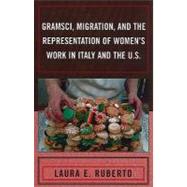Gramsci, Migration, and the Representation of Women's Work in Italy and the U.S.
, by Ruberto, Laura E.- ISBN: 9780739144329 | 0739144324
- Cover: Paperback
- Copyright: 12/30/2009
This book considers cultural representations of four different types of labor within Italian and U.S. contexts: stories and songs that chronicle the lives of Italian female rice workers, or mondine; testimonials and other narratives about female domestic servants in Italy in the second half of the twentieth century (including contemporary immigrants from non-western countries); cinematic representations of unwaged household work among Italian American women; and photographs of female immigrant cannery labor in California. These categories of labor suggest the diverse ways in which migrant women workers take part in the development of what Antonio Gramsci calls national popular culture, even as they are excluded from dominant cultural narratives. The project looks at Italian immigration to the U.S., contemporary immigration to Italy, and internal migration within Italy, the emphasis being on what representations of migrant women workers can tell us about cultural and political change. In addition to the idea of national popular culture, Gramsci's discussion of the social role of subalterns and organic intellectuals, the politics of folklore (or 'common sense') and everyday culture, and the necessity of alliance-formations among different social groups all inform the textual analyses. An introduction, which includes a reconsideration of Gramsci's theories in light of feminist theory, argues that the lives of subaltern classes (such as migrant women) are inherently connected to struggles for hegemony. A brief epilogue, on a lesser-known essay by photographer Tina Modotti, closes the discussion.







